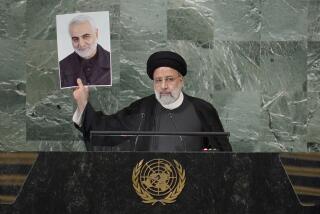Sanctions on Iraq Should Remain, Albright Tells U.N.
- Share via
UNITED NATIONS — Secretary of State Madeleine Albright urged the United Nations on Tuesday to maintain economic sanctions against Iraq, dismissing as well-intentioned but misinformed some religious and human rights organizations that say the measures are starving the Iraqi people.
“We must continue to do all we can to ease the hardships faced by Iraq’s people,” Albright said in what is expected was her final speech to the U.N. General Assembly. “But we must also defend the integrity of this institution, our security and international law.”
Talking to reporters after the address, Albright said she has done everything she can to persuade humanitarian groups that an existing oil-for-food program will feed Iraq’s people if the government of President Saddam Hussein will allow better distribution of food to areas under its control.
Under the program, Iraq is allowed to sell oil as long as the proceeds are used to buy food and medicine. So far, Albright noted, $8 billion in humanitarian supplies have been delivered as a consequence of the program, with another $6 billion in the pipeline. Supplies are more easily reaching areas inhabited by the minority Kurdish population and not dominated by the government.
Religious and human rights groups “may be well-meaning [but] they need to understand who the real villain is. The villain is Saddam Hussein,” Albright said. “It is not the international community that is keeping the Iraqi children and people from eating. It is Saddam Hussein.”
On Monday, U.N. Secretary-General Kofi Annan told the Security Council that Hussein’s government has refused to allow independent experts to enter Iraq and gauge the impact of sanctions on the public. Annan also said the Mideast nation is refusing to cooperate with the oil-for-food program, which it views as a violation of its sovereignty.
Albright said Iraq could end decade-old sanctions by cooperating with U.N. weapons inspectors. However, Hussein’s government has refused to permit a new U.N. agency, headed by Hans Blix, to determine if the regime has ended its production of weapons of mass destruction as ordered by the U.N. after the 1991 Persian Gulf War.
“Saddam Hussein is the one that can pick up the key and let himself out of the sanctions box,” she said. “He knows how to do it.”
At the same time, she said the United States will not take military action against Iraq to force compliance with weapons inspections. The penalty for Iraqi noncompliance must be a continuation of the sanctions, she said.
Albright had a new opportunity to make the case for Iraqi sanctions Tuesday when she met with representatives of several human rights groups for a discussion that was closed to the media and the public.
In her speech to the opening session of the annual General Assembly, Albright called on the world body to “stand up to the campaign launched by Baghdad against the U.N.’s authority and international law.” In addition to humanitarian organizations, several key members of the U.N.--including France, Russia and China--have suggested that the sanctions have run their course and should be removed.
While Albright disagreed with human rights groups about Iraq, she sided with them in chiding the world body and the international community for having too timid a response to repression in Myanmar and elsewhere.
“Some argue that speaking out in defense of human rights constitutes interference in internal affairs,” she said. “I believe it helps to fulfill the purposes of the U.N. Charter. When international norms are assaulted, the U.N. must do more than simply observe injustice, or report upon it, or sympathize with the victims. We must do all we can, where we can, to stop the perpetrators.”
Albright said that the rulers of Myanmar, formerly Burma, are trying to blame pro-democracy advocates for conditions that have led to repression of the opposition there.
“I can only reply that much the same was once said about Gandhi and Martin Luther King, Nelson Mandela and Vaclav Havel,” she said. “The world is not fooled. And we must not be silent.”
Later in the day, Albright turned her attention to the No. 2 person on Washington’s hate list: Yugoslav President Slobodan Milosevic. She met with the foreign ministers of a dozen countries located near Yugoslavia.
According to a senior State Department official who attended the session, all of the participants in the meeting agreed that Milosevic is trying to steal the Yugoslav presidential election scheduled for Sept. 24.
“The people who spoke to the issue directly were of two schools of thought,” the official said. “All agreed he would try to steal the election, but some felt that he might fail” and that the opposition might win despite expectations of intimidation and fraud.
More to Read
Sign up for Essential California
The most important California stories and recommendations in your inbox every morning.
You may occasionally receive promotional content from the Los Angeles Times.













